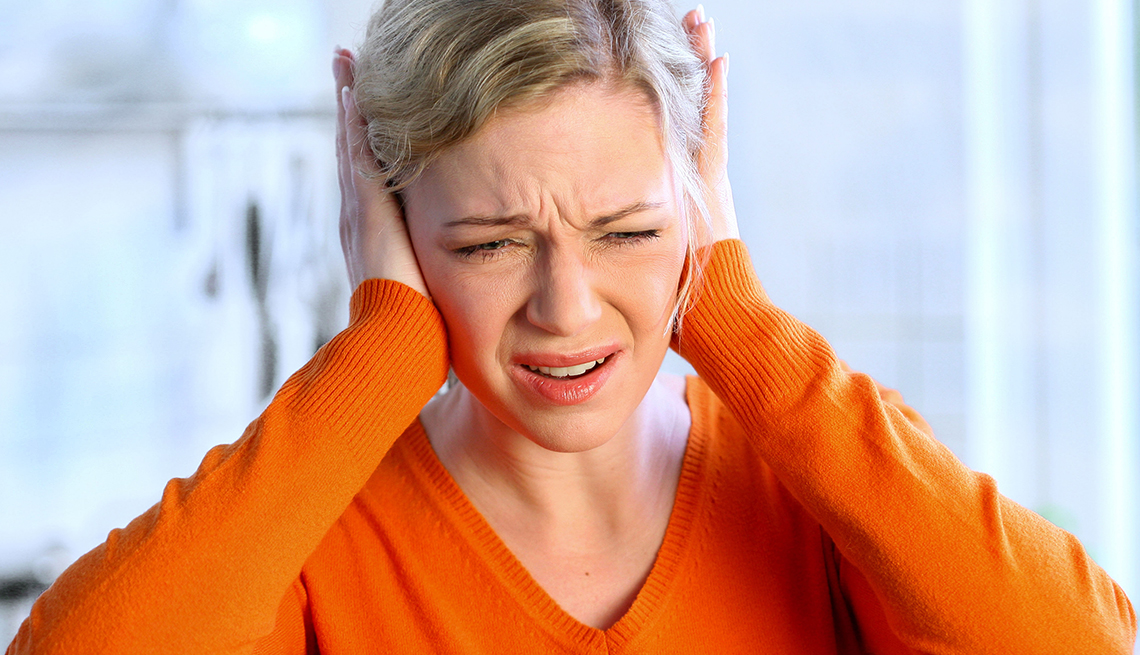
Our Blog
Sinus Infection Tinnitus: What You Can Do
Tinnitus can occur in children and adults, causing bothersome symptoms perceived as ringing, buzzing, or whooshing in one or both ears. Excessive exposure to loud noise is a common tinnitus risk factor. However, sinusitis or sinus infection can also cause tinnitus.
This phenomenon, known as sinus infection tinnitus, can be quite unsettling. In this article, we’ll learn more about this condition, how it connects to sinus infections, and what you can do to find relief.

What Is a Sinus Infection?
Sinus infections, also called sinusitis, occur when the thin, air-filled cavities located around your face and nose become inflamed and filled with fluid. This inflammation often stems from allergies, viruses, or bacteria. Below are some of the most common symptoms:
Facial pressure
Sinus headaches
Nasal congestion
Thick, discolored mucus discharge
The inner ear, middle ear, and nasal cavity are interconnected systems, which means one change can influence the other. For instance, this fluid stagnation in the nasal cavity and inner ear creates sinus pressure, aggravating the perception of sound or ringing in the ears.
In Canada, sinusitis is a very common reason people see their doctor. Around 10% of Canadians get it each year, making it one of the 10 most common diagnoses in primary care. Read on to discover the common causes of sinus infections.
Causes of Sinus Infections
Germs like bacteria, viruses, and allergens can irritate your nose and sinuses, leading to headaches. This can happen because your body is fighting the infection (weaker immune system) and because of the pressure buildup in your head.
Here are several factors that can trigger a sinus infection.
Colds
The most common culprit, a cold virus can inflame the tissues lining your sinuses, making them susceptible to infection.
Allergies
Allergies can trigger similar inflammation and congestion, creating ideal conditions for bacterial growth. Common allergens that can cause sinus problems include dust mites, pollen, pet dander, and mold.
Nasal Polyps
These benign growths in the nasal passages can obstruct drainage and increase the risk of infection. Nasal polyps are soft, painless growths that develop on the lining of your nose or sinuses. They can be caused by chronic inflammation, such as from allergies or recurring infections.
Structural Abnormalities
Deviations in the nasal septum (the wall dividing your nostrils) can impede drainage and contribute to sinusitis. A deviated septum is a shift in the position of the cartilage and bone that separates your nostrils. It can cause difficulty breathing, facial pain, and frequent sinus infections.
Can a Sinus Infection Cause Tinnitus?
Yes. While not the most common cause, the connection lies in your anatomy. The Eustachian tube, a small canal that connects your middle ear to the back of your throat, helps regulate pressure within the middle ear space. When an infection leads to sinus congestion, it can cause Eustachian tube dysfunction. This can cause pressure fluctuations in the middle ear, affecting the tiny hair cells responsible for the perception of sound.
As sinusitis worsens, it can completely block your airways and trigger ringing in your ears. The pressure from the swollen sinus cavity or the force you exert when blowing your nose can push on your eardrum, causing it to vibrate abnormally.
This inflammation can also contribute to pulsatile tinnitus (ringing with a pulsing rhythm) and hearing loss if not treated.
The Rarity of Tinnitus in Sinus Infections
Tinnitus isn’t the most frequent symptom of sinus infections. More commonly, patients experience facial pain, pressure, and nasal congestion. If you’re experiencing tinnitus, it’s crucial to have a tinnitus clinic Toronto consultation for an accurate diagnosis, as other underlying conditions can also cause or worsen tinnitus.
Moreover, a proper audiology clinic Toronto visit can help you explore treatment options fit for your needs. People experience tinnitus differently. The severity of your sinus infection can influence the likelihood and intensity of tinnitus. More severe infections with significant inflammation are more likely to cause noticeable tinnitus symptoms.
The Connection Between Sinusitis and Tinnitus
Even if tinnitus isn’t a typical symptom, how can a sinus infection worsen existing tinnitus? The pressure changes and inflammation associated with sinusitis can irritate the inner ear and auditory pathways, potentially amplifying existing tinnitus or making it more noticeable.
Interestingly, some research suggests a connection between the nerves involved in sinus function and those involved in hearing. When the sinus nerves are inflamed during a sinus infection, they might send confused signals to the brain, affecting the way the brain interprets sound and potentially contributing to tinnitus.
Will Sinus Infection Tinnitus Go Away?
Tinnitus caused by sinus infections is usually temporary and often resolves alongside the infection itself. As the infection clears and the swelling subsides, the Eustachian tube will function normally again and drain the sinuses. This allows pressure in the middle ear to regulate, and the tinnitus should subside along with the other sinus infection symptoms.
What Can You Do About Sinus Infection Tinnitus?
If you’re experiencing both a sinus infection and tinnitus, focus on treating the underlying infection. Tinnitus might not be the most pleasant symptom, but addressing the infection can significantly improve both issues. Here are some steps you can take for tinnitus relief.
Over-the-Counter Medications
Decongestants and pain relievers like ibuprofen can help alleviate congestion and pain, potentially reducing pressure on your ears and lessening tinnitus. Follow dosage instructions carefully and consult a doctor if you have any underlying health conditions that might interact with these medications.
Nasal Sprays
Saline nasal sprays can help moisten nasal passages and clear mucus, promoting drainage and potentially relieving pressure.
Regular ear cleaning from ear wax removal Toronto clinics is also important to remove excess earwax buildup, which can sometimes worsen tinnitus symptoms. Cotton swabs should never be inserted into the ear canal for cleaning. A warm saline solution with a bulb syringe can help gently loosen and remove earwax buildup near the outer ear canal. Click here to find out how long tinnitus lasts after ear wax removal.
Warm Compresses
Applying warm compresses to your face can help reduce sinus inflammation and promote drainage. The increased warmth can improve circulation and soothe the discomfort associated with both the sinus infection and tinnitus. Applying oils for tinnitus might provide some relief, but this is generally not recommended by professionals.
Stay Hydrated
Drinking plenty of fluids will help thin mucus and make it easier to drain from your sinuses. This reduces congestion and pressure buildup, potentially alleviating tinnitus caused by the sinus infection.
Conclusion
While sinus infections may not be the most common cause of tinnitus, they can sometimes contribute to the ringing sensation in your ears. Fortunately, tinnitus linked to sinusitis often improves alongside the infection’s resolution. By managing your sinus infection with medical treatment and healthy lifestyle practices, you can find relief from both the infection and its associated tinnitus.
If your tinnitus persists or worsens even after your sinus infection clears, consult a doctor or an ear and throat specialist (otolaryngologist) for an accurate diagnosis and further treatment options to ensure your overall hearing health.
